stdClass Object
(
[id] => 16270
[title] => The Infinite Meekness that Saves Us
[alias] => the-infinite-meekness-that-saves-us
[introtext] => Narrative Capitals/10 - The challenge to prevent the transformation of the ideal into ideology
by Luigino Bruni
published in Avvenire on 14/01/2018
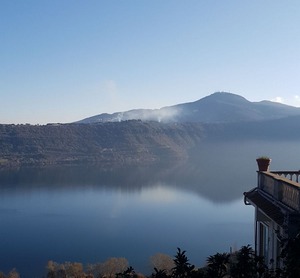 “And now look again, and see what will naturally follow if the prisoners (the people bound inside the cave) are released and disabused of their error. At first, when any of them is liberated and compelled suddenly to stand up and turn his neck round and walk and look towards the light... ...do you think that he would care for such honours and glories, or envy the possessors of them (among the prisoners - the tr.)? ...I think that he would rather suffer anything than entertain these false notions and live in this miserable manner. ...would he not be ridiculous? ...and if any one tried to loose another and lead him up to the light, let them only catch the offender, and they would put him to death.”
“And now look again, and see what will naturally follow if the prisoners (the people bound inside the cave) are released and disabused of their error. At first, when any of them is liberated and compelled suddenly to stand up and turn his neck round and walk and look towards the light... ...do you think that he would care for such honours and glories, or envy the possessors of them (among the prisoners - the tr.)? ...I think that he would rather suffer anything than entertain these false notions and live in this miserable manner. ...would he not be ridiculous? ...and if any one tried to loose another and lead him up to the light, let them only catch the offender, and they would put him to death.”
Plato The Republic (English translation by Benjamin Jowett)
It is typical of ideological thinking - of every ideology but above all those of a religious nature - to create a dichotomic or gnostic type of representation of the world. Happiness, beauty, truth, and the special light of those who are inside that experience are exalted, and the ordinary happiness and beauty of those who are outside are devalued. Friendship, work, play, art and everyone's life are not enough anymore. There is a need to load these realities with additional, extraordinary and diverse meanings. And soon we end up no longer being able to rejoice in seeing a "friend and nothing more", of "just working and nothing more", of "just praying and that’s all", of "just painting and that’s all". We begin to believe that simple life is not enough to live. And while we are convinced that we live more than others, we risk ceasing to really live.
[fulltext] => This process of reducing the value of ordinary things in life is particularly important and relevant when dealing with people who have creative talents: artists, intellectuals, poets, philosophers, theologians... They are innovators, capable of primary and original creativity, which allows the charisma to remain generative. They are the charisma of the charisma. Ideal and charismatic communities, especially in the founding phase, attract people with special and artistic talents. There is a profound affinity between spiritual and artistic charismas, because both are voices that call, speak and guide from inside. At the same time, it is equally common that after the foundation phases many of the people with the greatest talents leave or burn out - and sometimes the artistic vocation is lost or extinguished with the loss of the ideal vocation, because over time the two voices have (almost) become one.
These unfortunate outcomes depend profoundly on the ability of the community (and its founders/leaders) to care for and respect the original talents of their people, not to sacrifice them on the altar of the institution's growth demands. They also depend from succeeding in winning over the natural avarice to use those talents and those fascinating people primarily for the ideal goals of the community. In communities, those who have received a gift of creativity and a spiritual vocation at the same time have the precious task of preventing the transformation of the ideal into ideology. Because the primary and direct contact with life that is typical (although not exclusive) of artists and intellectuals allows for that plurality and biodiversity which is the salvation of communities from the ideological drift. They are people who manage to say different things in different ways, and this original and primal diversity allows the ideals to remain genuine and alive. Artistic vocation, like the spiritual and charismatic one, is in fact an original, primitive and non-derived vocation. But it is not easy, albeit decisive, to understand that people can have more vocations, original and primary ones, without one of them necessarily having to die in order to make the other live. Identity grows well if one dimension of life does not become a monopoly. But all this is very risky, and so one ends up preferring people who are "reduced" but certain to those who are "whole" but uncertain.
Communities, especially spiritual and charismatic ones, usually do not want "artists and nobody else", they want and form artists and intellectuals totally dedicated to the service of the message. They do not believe that it is from "art and nothing else" that the special charismatic art that they feel the need for may flourish. And so they think of obtaining a different art by orienting the first natural vocation to the second ideal one. They do so in various ways. Sometimes simply by preventing them from cultivating the violin, literature, dance or their studies, so that they can dedicate all their vital and spiritual energies to the new "vocation". At other times, and these are the most interesting cases to be analysed, they ask them to subordinate their talent and creativity to the aims of the community and its message. Previously they sculpted flowers and reliefs; now only crucifixes and angels.
They take them away from normal environments belonging to everyone that are mixed and diverse, where real life grows, and they put them on a vacuum-sealed pedestal to give glory to the community and its charisma, maybe to God, through their works. Art and culture thus become ideological production, where the message "devours" art and thought (and God), for lack of gratuitousness and freedom - history offers us abundant evidence of this. From being primary, the artistic-intellectual vocation becomes secondary and ancillary.
Artists can serve their communities if they are able to remain directly connected to the deep layers of the earth that are different from those on which the charisma of the community draws. It is this different type of water that enriches everyone's water (and their own). If, on the other hand, one day the community decides to obstruct direct access to the different underground vein, and connects the artist to the only spring of all with a connecting tube, the whole common field loses nourishment and fertility. Artistic and originally creative vocations are a common good if they manage to bring waters that are different from that which flows abundantly from the fountain of the founders. And when the ideological virus takes hold, all the fountains of the community are connected to the only main aqueduct.
The narrative poverty of many ideal-driven organisations (IDO) does not depend only on the scarcity of narrative talents - and therefore of artists and intellectuals. It is not so much the lack of talent that blocks the development and attractiveness of ideal-driven communities in the generations that follow their foundation. The crisis is the result of the famine of "whole”, free and original artistic and intellectual vocations.
In these processes and scenarios, an important role is also played by the management and maintenance that the individual person makes of their artistic-intellectual vocation. After the first happy times (years) when the new "second call" absorbs any previous desire and fantasy, if growth is good there is a point when the conflict builds up between the individual voice and that of the community (which we analysed last Sunday, in the previous article). When (and if) the day of the "awakening" arrives, even the bearer of an artistic vocation is called to make a choice, just like and differently from all the other members. But the artist-intellectual has specific and very relevant responsibilities. If you choose the false type of authenticity, the damage it causes is profound and serious. All fictions are harmful in life and especially in the IDO-s; but few things are more harmful than fake artists and intellectuals. If, once freed from ideological chains, and having seen reality distinguishing it from its shadow, an artist returns to his chained comrades and instead of freeing them, chooses to bind himself again and then begins to speak of shadows as if they were reality, he begins to lose his soul and seriously compromises the good growth of the spirit of his community. Remaining in the ideology is an evil for everyone, but it is a mortal and death bringing evil for those who have had the gift of recognizing ideology but speak of it as if it were reality.
This is one of the many expressions of the phenomenon of false prophecy, very old and very serious, and for this reason it is described extensively by the biblical prophets. We find it again when the "prophet" decides (for weakness or for interests) to silence the voice that continues to inhabit him and instead begins to say the things the community and leaders want them to tell. And they become a false prophet (and soon the voice inside is extinguished). The community loses quality, biodiversity and generativity. And their charisma burns out. Alongside the false prophets who know that they are, there are others who are in good faith, either because they are still too "young" and therefore do not experience any tension in the soul between the two voices, or because they sincerely believe that they live their authenticity by voluntarily sacrificing their first vocation to the new (many of them, in reality, did not have an authentic vocation in the first place, but only assumed an artistic-intellectual job for themselves).
The quality of the present and future of these communities depends above all on the dynamics and evolution of the choices made by those artists-intellectuals who seek to remain faithful to the two primary vocations of their lives. They are in a particularly uncomfortable and painful position. They must be guardians of the "second vocation of the community" as well as the "first artistic vocation". But the custody of the first vocation is an individual and often solitary enterprise: there are no community instruments that protect it and very few helpers and counsellors who understand it. As time goes by, here too, the tension between the two voices grows, and the temptation to sacrifice the first to the second vocation becomes strong; a sacrifice that many would like and greet with a roaring applause. There is a need for infinite meekness so that plural vocations can continue to live and make people live.
The existence and resilience of a small number of people capable of being faithful to their two vocations is essential for the salvation of ideal-driven communities. Because the IDO that in its development consumes the most creative people that providence sent to write its new and beautiful pages does not generate any good new narrative capital. The biblical logic of the faithful "remnant" is at the root of the salvation of ideal-driven communities in times of exiles and of the destruction of temples. They will write and rewrite the first stories of the fathers, compose new spiritual songs and hymns, remember and preserve the first covenant and the first promise. To prepare the non-vain expectation of a new, marvellous alliance.
***
Today, our immersion in the narrative capitals of IDO-s and communities ends. There would be many other things to say, and perhaps we will say them in a forthcoming series of articles. From next Sunday we will return to immerse our hearts and thoughts in the Bible, with the commentary on the Books of Samuel and their infinite stories. Thanks, again, to those who have followed me through these ten episodes, to the many readers who have sent me valuable comments, criticisms and suggestions, to the generous trust granted to me by director Marco Tarquinio and Avvenire, allowing me to continue my humble and tenacious search for new, living words to love our time.
download article in pdf
[checked_out] => 0
[checked_out_time] => 0000-00-00 00:00:00
[catid] => 843
[created] => 2018-01-13 19:27:00
[created_by] => 64
[created_by_alias] => Luigino Bruni
[state] => 1
[modified] => 2020-08-23 20:24:47
[modified_by] => 609
[modified_by_name] => Super User
[publish_up] => 2018-01-19 10:00:00
[publish_down] => 0000-00-00 00:00:00
[images] => {"image_intro":"","float_intro":"","image_intro_alt":"","image_intro_caption":"","image_fulltext":"","float_fulltext":"","image_fulltext_alt":"","image_fulltext_caption":""}
[urls] => {"urla":false,"urlatext":"","targeta":"","urlb":false,"urlbtext":"","targetb":"","urlc":false,"urlctext":"","targetc":""}
[attribs] => {"article_layout":"","show_title":"","link_titles":"","show_tags":"","show_intro":"","info_block_position":"","info_block_show_title":"","show_category":"","link_category":"","show_parent_category":"","link_parent_category":"","show_associations":"","show_author":"","link_author":"","show_create_date":"","show_modify_date":"","show_publish_date":"","show_item_navigation":"","show_icons":"","show_print_icon":"","show_email_icon":"","show_vote":"","show_hits":"","show_noauth":"","urls_position":"","alternative_readmore":"","article_page_title":"","show_publishing_options":"","show_article_options":"","show_urls_images_backend":"","show_urls_images_frontend":""}
[metadata] => {"robots":"","author":"","rights":"","xreference":""}
[metakey] =>
[metadesc] => Artists, intellectuals and people who have the gifts of original creativity are essential for writing and rewriting the narrative capitals of communities. But these same communities find it very difficult not to consume those very people of whom they have a vital need.
[access] => 1
[hits] => 3430
[xreference] =>
[featured] => 0
[language] => en-GB
[on_img_default] =>
[readmore] => 10338
[ordering] => 1
[category_title] => EN - Narrative Capitals
[category_route] => organizzazioni-e-ideali/it-capitali-narrativi
[category_access] => 1
[category_alias] => en-narrative-capitals
[published] => 1
[parents_published] => 1
[lft] => 156
[author] => Luigino Bruni
[author_email] => ferrucci.anto@gmail.com
[parent_title] => Organizzazioni e Ideali
[parent_id] => 1028
[parent_route] => organizzazioni-e-ideali
[parent_alias] => organizzazioni-e-ideali
[rating] => 0
[rating_count] => 0
[alternative_readmore] =>
[layout] =>
[params] => Joomla\Registry\Registry Object
(
[data:protected] => stdClass Object
(
[article_layout] => _:default
[show_title] => 1
[link_titles] => 1
[show_intro] => 1
[info_block_position] => 0
[info_block_show_title] => 1
[show_category] => 1
[link_category] => 1
[show_parent_category] => 1
[link_parent_category] => 1
[show_associations] => 0
[flags] => 1
[show_author] => 0
[link_author] => 0
[show_create_date] => 1
[show_modify_date] => 0
[show_publish_date] => 1
[show_item_navigation] => 1
[show_vote] => 0
[show_readmore] => 0
[show_readmore_title] => 0
[readmore_limit] => 100
[show_tags] => 1
[show_icons] => 1
[show_print_icon] => 1
[show_email_icon] => 1
[show_hits] => 0
[record_hits] => 1
[show_noauth] => 0
[urls_position] => 1
[captcha] =>
[show_publishing_options] => 1
[show_article_options] => 1
[save_history] => 1
[history_limit] => 10
[show_urls_images_frontend] => 0
[show_urls_images_backend] => 1
[targeta] => 0
[targetb] => 0
[targetc] => 0
[float_intro] => left
[float_fulltext] => left
[category_layout] => _:blog
[show_category_heading_title_text] => 0
[show_category_title] => 0
[show_description] => 0
[show_description_image] => 0
[maxLevel] => 0
[show_empty_categories] => 0
[show_no_articles] => 1
[show_subcat_desc] => 0
[show_cat_num_articles] => 0
[show_cat_tags] => 1
[show_base_description] => 1
[maxLevelcat] => -1
[show_empty_categories_cat] => 0
[show_subcat_desc_cat] => 0
[show_cat_num_articles_cat] => 0
[num_leading_articles] => 0
[num_intro_articles] => 14
[num_columns] => 2
[num_links] => 0
[multi_column_order] => 1
[show_subcategory_content] => -1
[show_pagination_limit] => 1
[filter_field] => hide
[show_headings] => 1
[list_show_date] => 0
[date_format] =>
[list_show_hits] => 1
[list_show_author] => 1
[list_show_votes] => 0
[list_show_ratings] => 0
[orderby_pri] => none
[orderby_sec] => rdate
[order_date] => published
[show_pagination] => 2
[show_pagination_results] => 1
[show_featured] => show
[show_feed_link] => 1
[feed_summary] => 0
[feed_show_readmore] => 0
[sef_advanced] => 1
[sef_ids] => 1
[custom_fields_enable] => 1
[show_page_heading] => 0
[layout_type] => blog
[menu_text] => 1
[menu_show] => 1
[secure] => 0
[helixultimatemenulayout] => {"width":600,"menualign":"right","megamenu":0,"showtitle":1,"faicon":"","customclass":"","dropdown":"right","badge":"","badge_position":"","badge_bg_color":"","badge_text_color":"","layout":[]}
[helixultimate_enable_page_title] => 1
[helixultimate_page_title_alt] => Capitali narrativi
[helixultimate_page_subtitle] => Organizzazioni e Ideali
[helixultimate_page_title_heading] => h2
[page_title] => Narrative Capitals
[page_description] =>
[page_rights] =>
[robots] =>
[access-view] => 1
)
[initialized:protected] => 1
[separator] => .
)
[displayDate] => 2018-01-13 19:27:00
[tags] => Joomla\CMS\Helper\TagsHelper Object
(
[tagsChanged:protected] =>
[replaceTags:protected] =>
[typeAlias] =>
[itemTags] => Array
(
)
)
[slug] => 16270:the-infinite-meekness-that-saves-us
[parent_slug] => 1028:organizzazioni-e-ideali
[catslug] => 843:en-narrative-capitals
[event] => stdClass Object
(
[afterDisplayTitle] =>
[beforeDisplayContent] =>
[afterDisplayContent] =>
)
[text] => Narrative Capitals/10 - The challenge to prevent the transformation of the ideal into ideology
by Luigino Bruni
published in Avvenire on 14/01/2018
 “And now look again, and see what will naturally follow if the prisoners (the people bound inside the cave) are released and disabused of their error. At first, when any of them is liberated and compelled suddenly to stand up and turn his neck round and walk and look towards the light... ...do you think that he would care for such honours and glories, or envy the possessors of them (among the prisoners - the tr.)? ...I think that he would rather suffer anything than entertain these false notions and live in this miserable manner. ...would he not be ridiculous? ...and if any one tried to loose another and lead him up to the light, let them only catch the offender, and they would put him to death.”
“And now look again, and see what will naturally follow if the prisoners (the people bound inside the cave) are released and disabused of their error. At first, when any of them is liberated and compelled suddenly to stand up and turn his neck round and walk and look towards the light... ...do you think that he would care for such honours and glories, or envy the possessors of them (among the prisoners - the tr.)? ...I think that he would rather suffer anything than entertain these false notions and live in this miserable manner. ...would he not be ridiculous? ...and if any one tried to loose another and lead him up to the light, let them only catch the offender, and they would put him to death.”
Plato The Republic (English translation by Benjamin Jowett)
It is typical of ideological thinking - of every ideology but above all those of a religious nature - to create a dichotomic or gnostic type of representation of the world. Happiness, beauty, truth, and the special light of those who are inside that experience are exalted, and the ordinary happiness and beauty of those who are outside are devalued. Friendship, work, play, art and everyone's life are not enough anymore. There is a need to load these realities with additional, extraordinary and diverse meanings. And soon we end up no longer being able to rejoice in seeing a "friend and nothing more", of "just working and nothing more", of "just praying and that’s all", of "just painting and that’s all". We begin to believe that simple life is not enough to live. And while we are convinced that we live more than others, we risk ceasing to really live.
[jcfields] => Array
(
)
[type] => intro
[oddeven] => item-odd
)







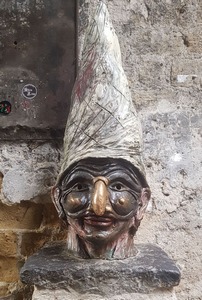 “But one had to be talented to be able to age without becoming an adult ".
“But one had to be talented to be able to age without becoming an adult ".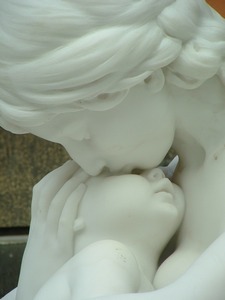 When a truly original genius makes its appearance in the world, people make haste to get rid of it. To achieve this goal they have two methods. The first is elimination. In the event of failure, they adopt the second method (which is much more radical and hideous): exaltation, putting it on a pedestal and transforming it into a "god".
When a truly original genius makes its appearance in the world, people make haste to get rid of it. To achieve this goal they have two methods. The first is elimination. In the event of failure, they adopt the second method (which is much more radical and hideous): exaltation, putting it on a pedestal and transforming it into a "god". But when Cephas (Peter) came to Antioch, I opposed him to his face, because he stood condemned. (...) But when I saw that their conduct was not in step with the truth of the gospel, I said to Cephas before them all, “If you, though a Jew, live like a Gentile and not like a Jew, how can you force the Gentiles to live like Jews?”
But when Cephas (Peter) came to Antioch, I opposed him to his face, because he stood condemned. (...) But when I saw that their conduct was not in step with the truth of the gospel, I said to Cephas before them all, “If you, though a Jew, live like a Gentile and not like a Jew, how can you force the Gentiles to live like Jews?” “Poverty is the first virtue to be discovered by all founders, and the first one to be forgotten by their successors."
“Poverty is the first virtue to be discovered by all founders, and the first one to be forgotten by their successors." 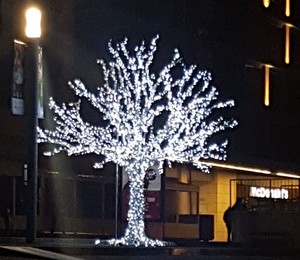 «Human desire will forever remain only in its irreducible character (resistant to) any reduction and adaptation. »
«Human desire will forever remain only in its irreducible character (resistant to) any reduction and adaptation. » “Only infinite love can reduce itself and, in order to become finite, become incarnated in order to love the other, to love the other as a finite other.”
“Only infinite love can reduce itself and, in order to become finite, become incarnated in order to love the other, to love the other as a finite other.”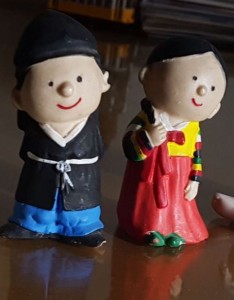 «Ci sono le voci.
«Ci sono le voci.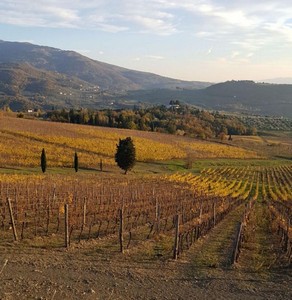 “The great writers project their shadow in two directions simultaneously. In one they offer their shadow to their predecessors, in the other to those who follow them".
“The great writers project their shadow in two directions simultaneously. In one they offer their shadow to their predecessors, in the other to those who follow them".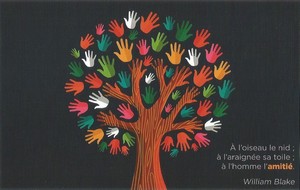 “We have to work in those intermediate areas between several orders of disciplines, in which exceptional wealth is often accumulated, like at the border of two different areas.”
“We have to work in those intermediate areas between several orders of disciplines, in which exceptional wealth is often accumulated, like at the border of two different areas.”